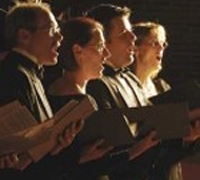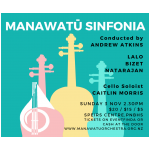Manawatu Youth Orchestra

Saturday 8 June 2.30pm Speirs Centre
Philidor - Solo Timpani
Charpentier - Marche de triomphe 1 and 2
Charpentier - Te Deum, 1. Prelude
Beethoven - Symphony No7
Buy tickets here
Vesa-Matti Leppänen
Born and raised in Finland, Vesa-Matti Leppänen relocated to New Zealand in 2000. In 2002, he was appointed as the Concertmaster of the NZSO, a position he has held since then.
He has performed as soloist with all the major orchestras in New Zealand. With the NZSO, he has performed several concertos as well as works by leading New Zealand composers. In 2005 he led the NZSO on its European/Japanese Tour and again in 2010, including unforgettable performances in the Musikverein in Vienna and Lucerne Festival Hall. On both of those tours he was also featured as a soloist.
Internationally, Leppänen has appeared as a soloist, chamber musician and concertmaster in Australia, China, Japan, South Korea, Singapore, Hong Kong, Philippines and Scandinavia and has had the privilege of serving as a guest concertmaster for numerous esteemed orchestras. These include the Sydney and Melbourne Symphony Orchestras, the Japan Philharmonic, Orchestra Ensemble Kanazawa, the Singapore Symphony Orchestra, KBS Symphony Orchestra, the Tasmanian Symphony Orchestra, and Avanti! Chamber Orchestra.
This is Vesa’s first concert conducting the MYO. Vesa says, “I’m very passionate in matching the expectations with the level of talent to make every project as rewarding as possible. This would involve creating a set of repertoire that is exciting for the audiences but more importantly for the keen youngsters.”
Joanna Dann
Joanna grew up in the Manawatu, playing cello in the local orchestras and in chamber music ensembles with friends and family. She pursued cello studies at the University of Waikato with James Tennant and the University of Otago with Heleen du Plessis, during which she performed in the Opus Orchestra in Hamilton, Dunedin Symphony Orchestra and the NZSO National Youth Orchestra.
Since completing her cello studies in early 2022, Joanna has taken steps towards pursuing conducting, learning with Kenneth Young, Peter Adams and Martin Riseley. She is currently freelancing and teaching music in Wellington and Palmerston North.
Philidor - Solo Timpani
Charpentier - Marche de triomphe 1 and 2
Charpentier - Te Deum, 1. Prelude
Beethoven - Symphony No7
The music in this afternoon’s concert has, albeit unintentionally, a French military theme, its two composers from opposing nations in European conflicts a century apart. They are, too, conceptually very different.
Marc-Antoine Charpentier’s Te Deum was composed between 1688 and 1698 during the reign of Louis XIV. It is thought to have been performed as part of victory celebrations by the French Army of a battle in the then Spanish Lowlands (now Belgium). Triumphal in character, it has more recently found fame as the theme music for the Eurovision Song Contest, used since the contest begun 68 years ago. Uncomplicated, the music captures the pomp and swagger of the French Sun King and his court.
Beethoven composed his 7th symphony some 115 years later when the French army under Napoleon had just been defeated at the gates of Moscow. Indeed, the German composer’s work was premiered at a charity concert for soldiers wounded in a battle between Austro-Bavarian and retreating French troops. Beethoven regarded the symphony as one of his finest pieces; the haunting second movement has always been popular – encored immediately at the premier concert. It is regularly used as movie music, most recently in ‘The King’s Speech’, when the British Prime Minister, played by Colin Firth, announces his nation and empire’s entry into the second world war.
Despite this martial connection, the symphony, as Wagner noted, is imbued with a sense of dance. The foot-tapping rhythmic themes give the music drive and energy throughout and seemingly descends into a peasant dance in the last movement. Beethoven was almost completely deaf when he wrote the symphony and could only sense the orchestra he was conducting by feeling the vibrations of the music through the floor with his feet. This is music to be sensed. Perhaps, he went too far – the relentless chord-thrashing in the last movement was seen by some at the time as a sign of Beethoven’s apparent decline into madness. Regardless, this is exciting music!
How to join
Click here for details on how to join the Manawatu Youth Orchestra or the Manawatu Sinfonia.

